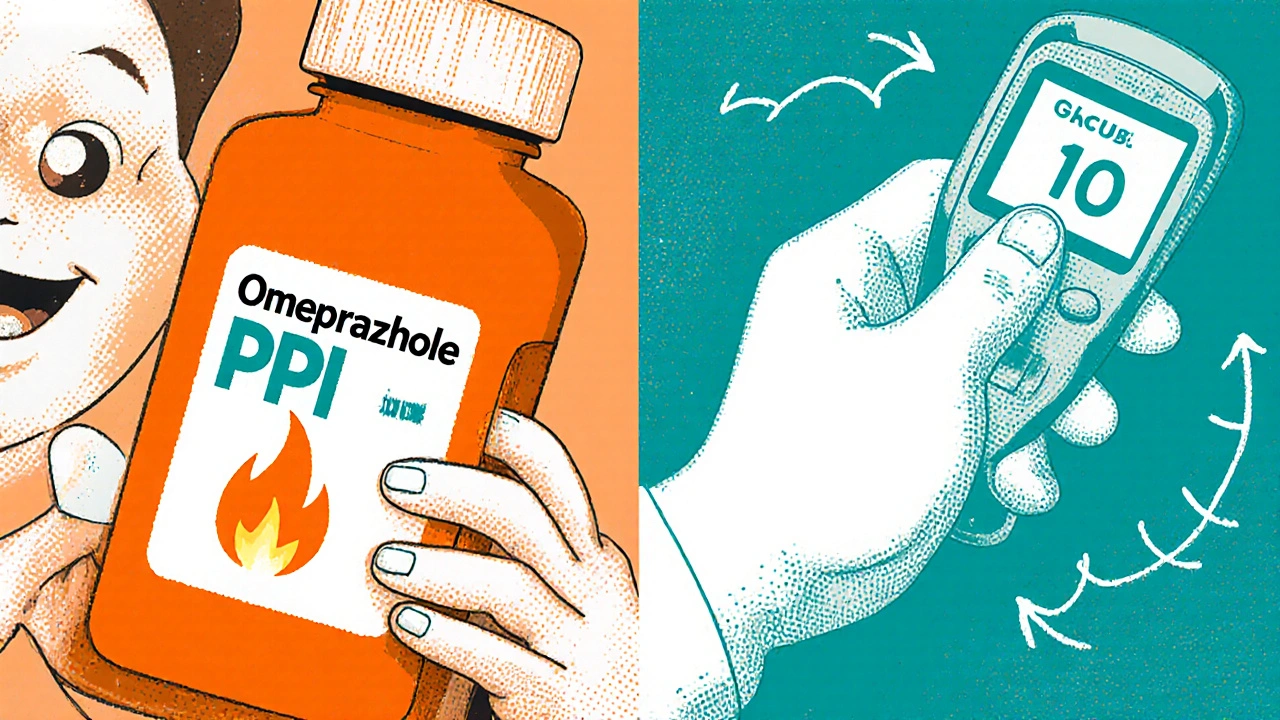Omeprazole and Diabetes: Essential Facts for Patients
Learn how Omeprazole may affect blood sugar, what research shows, and practical steps for diabetes patients using this common heartburn drug.
Continue ReadingIf heartburn or acid reflux bothers you daily, a proton pump inhibitor (PPI) is a common fix doctors prescribe. PPIs like omeprazole, esomeprazole, pantoprazole, lansoprazole, and rabeprazole cut stomach acid by blocking the proton pump in stomach lining cells. That makes them powerful for healing esophagitis and ulcers and for easing long-term reflux.
PPIs treat more than heartburn. Doctors use them for GERD, peptic ulcers (often with antibiotics for H. pylori), Zollinger-Ellison syndrome, and to protect the stomach if you take long-term NSAIDs. They work slower than antacids but last longer—usually 24 hours or more after a single dose.
Timing matters. Take most PPIs 30–60 minutes before your biggest meal of the day; that boosts their effect. Don’t crush or chew delayed-release capsules or tablets—swallow whole. If you miss a dose, take it when you remember unless it’s almost time for the next one. Use the lowest effective dose for the shortest time that works.
Short courses (2–8 weeks) are common and usually safe. But if symptoms return when you stop, talk with your provider about stepping down the dose or trying alternatives. Suddenly stopping long-term PPIs can cause rebound acid—your stomach may produce more acid for a few weeks, which feels worse than before.
Short-term side effects are usually mild: headache, nausea, diarrhea, or constipation. Long-term use has been linked to lower vitamin B12 and magnesium levels, a small increased risk of bone fractures, higher risk of C. difficile infection, and possible links to chronic kidney disease in some studies. Weigh these risks against benefits—if your ulcers or reflux are severe, the benefit often outweighs the risk.
Also know about drug interactions. For example, omeprazole can reduce activation of clopidogrel, a blood thinner, and may affect some antiviral drugs. Always tell your doctor about all meds you take, including supplements.
Want to avoid a PPI? Try lifestyle fixes first: cut late-night meals, lose weight if needed, stop smoking, and avoid trigger foods like coffee, alcohol, and very spicy or fatty foods. H2 blockers (like famotidine) and antacids can help milder symptoms, though they’re not as strong for healing serious damage.
When to see a doctor right away: unintended weight loss, trouble swallowing, severe or persistent vomiting, black or bloody stools, or chest pain that could be cardiac. Those are alarm signs that need prompt attention.
Bottom line: PPIs are effective and often necessary. Use them thoughtfully—right dose, right timing, and regular check-ins with your clinician if you’re on them long term.

Learn how Omeprazole may affect blood sugar, what research shows, and practical steps for diabetes patients using this common heartburn drug.
Continue Reading
Dig into everything you never thought you needed to know about Prilosec (omeprazole). This article takes you beyond the quick fix and explains how the drug works, the real talk on side effects, surprising tips, and how you can get the best results safely. If you, your family, or your friends are reaching for acid reducers, this read will prep you with answers and insights that matter long term.
Continue Reading